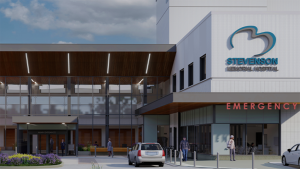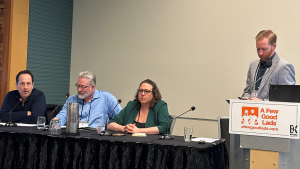The COVID-19 pandemic has impacted municipalities across Canada in different ways and although they all faced different challenges, the consensus is transit infrastructure projects are still essential for economic recovery.
Building your way out of the pandemic was a recurring theme during a panel discussion billed Identifying Creative Solutions for Rising out of a Pandemic and Transitioning to a New Era of Transit Planning and Delivery, which was part of the seventh annual Urban Transit Infrastructure National Symposium. The panel was moderated by Mark Romoff, president and CEO of the Canadian Council for Public-Private Partnerships.
“We built our way out of COVID-19. We accelerated our infrastructure and all of our development,” said Doug McCallum, mayor of the City of Surrey, B.C. “We got the province to approve construction workers as essential services, therefore we could keep them working. Over the last year when a lot companies were shut down we did over $1.5 billion in building permits, which is a high in a 10-year period of time.”
Mary-Frances Turner, president of the York Region Rapid Transit Corporation, said there is a direct correlation between economic recovery, infrastructure investment and accommodating growth for the future. The corporation took advantage of the pandemic to finish part of the vivaNext rapid transit project in York Region.
“We definitely took the opportunity to really say, ‘how do you really take advantage of this moment?’ ” explained Turner. “For a unique time in our history, our roads were quiet, our businesses were, in many cases, shut. So really using that, equipping our staff and the constructors with the equipment that they needed, we were able to complete the last segment of the project within the same time period that we had identified pre-COVID.”
McCallum said the $3 billion rapid transit SkyTrain in Surrey will create up to 3,000 jobs. He said the key in the future will be building infrastructure where it is needed.
“It really bumps up the economy in the eastern part of Vancouver where the growth is happening,” he said, adding many highrises are being built as well. “I think if we look at that new construction, not only what jobs it creates, but the communities that will build up and people that will live nearby to transit in the future.”
Charl van Niekerk, executive vice-president, transit with Infrastructure Ontario, said the focus over the last year has been on how best to deliver projects, including lowering and managing overall risk.
“Embracing new contract and packaging strategies, delivery models, modes of risk transfer and optimizing our procurement processes just to get this work out quicker and helping our market adapt better,” he said. “We want to provide all options to our teams to best align delivery strategies with specific projects and the specific constraints and opportunities on those projects.”
Turner said Canada is decades behind in terms of major investment in infrastructure. Working with partners to get projects planned and designed so they can move into construction sooner is critical.
“The partnership that is needed with government, the partnership that is needed with the constructor, the partnership that is needed with utilities, and it’s only in that context that any model can find its way to being successful,” Turner said. “Getting on the ground together earlier, as soon as possible, to understand the nature and the complexity of these problems will make a huge difference to the success of whatever procurement models we land on.”
Dave Reage, executive director of Halifax Transit, said council passed a rapid transit strategy three months into the pandemic.
“There was certainly no thoughts of a pause there and as a municipality we have certainly made it a priority to keep tendering projects, keep supporting the construction industry for economic development, so that they are still there post COVID in terms of being able to support future projects,” he said.
He added there is a shift occurring in Halifax and in other parts of the country where there is more focus on suburban areas.
“That’s really becoming a bit of a trend where your downtown office workers are the ones more likely to be at home,” Reage noted. “Our buses going into industrial areas were the busiest buses throughout the pandemic. I think the funding is still going to be there, I think the need is going to be there. What we have to keep an eye on is some of those destinations shifting. That creates challenges in terms of it’s much easier to run a rapid transit line into a downtown than an industrial park.”
Follow the author on Twitter @DCN_Angela.











Recent Comments
comments for this post are closed